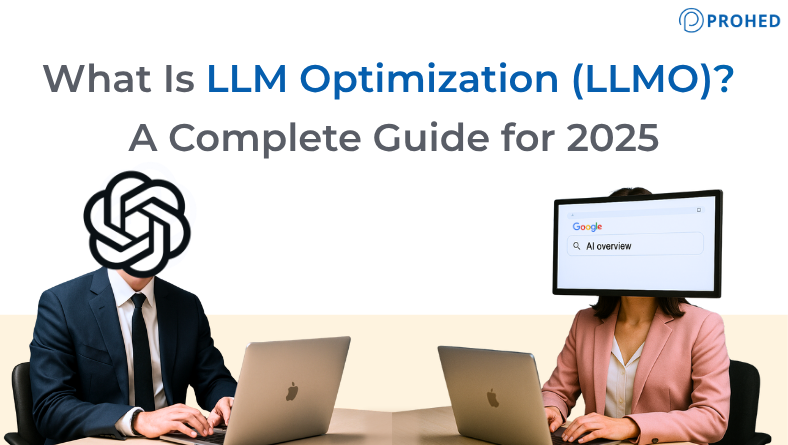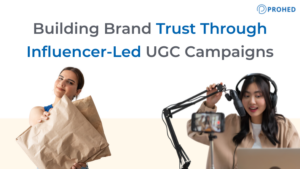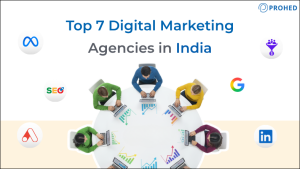Few things in recent years have impacted the digital world like the rise of generative AI. Large Language Models (LLMs) like OpenAI’s ChatGPT, Anthropic’s Claude, and Meta’s LLaMA are continually transforming how users search and consume content. On the other hand, they’re also changing how the creators are producing content.
Users across the globe are swiftly moving towards AI tools to get answers to their questions. For digital marketers, it means there’s a new frontier to contest the battle of scoring the most impressions and clicks. And there’s a new trade for them to master: Large Language Model Optimization, i.e., LLM Optimization (LLMO).
While traditional SEO (Search Engine Optimization) was all about helping content rank higher on search engines like Google, LLM Optimization is the process of optimizing content in such a way that it is picked up, understood, and featured in answers given by LLM platforms like ChatGPT, Claude, and Perplexity.
LLM Optimization: Definition & Key Elements
As a whole, LLMO (much like SEO) is not one act but a set of practices aimed at enhancing the visibility and usability of content in AI-generated answers.
What are some key elements of LLMO?
- Giving clear and concise answers to the queries raised within your content (In other words, avoiding fluff).
- Using consistent language to build topical authority
- Earning citations to build trust with AI platforms
- Providing intent-driven content that is backed up well by sources
Why Does It Matter?
Traditional search engines used to index web pages. Hence, the race was to rank on the very first SERP and get in among the very first few web pages indexed. LLMs, on the other hand, summarize, synthesize, and reference content from across their database and answer questions precisely.
Hence, your content will feature in the LLM’s answer only if:
- Aligned with user intent in a world driven by prompts.
- It is part of the LLM’s knowledge base
- It has citations as a trustworthy source
In a nutshell, LLMs have shifted the focus of content creators and digital marketers. It isn’t as much about keywords and links as it used to be. With LLMs, it is all about intent and context.
In other words, when users ask questions from a platform like ChatGPT or Perplexity, they expect a clear, concise, and structured answer.
Core Pillars of LLM Optimization Strategy
It is still early days, and the world of LLM optimization is destined to undergo quite a lot of transformation.
However, here are some strategies that can come in handy for content creators and marketers to ensure that their content appears in AI-generated answers and recommendations.
Focus On Content Structuring
Large Language Models (LLMs) have been trained to understand the hierarchy and meaning of the content, along with its meaning.
So, to appear in an LLM’s answer, the content must be:
- Structured well with headings right from the H1 to the H4 tags.
- Free from any level of keyword stuffing.
- Rich in context with clear topic clusters
- Written in an easy-to-understand, natural, and human tone
Bonus Tip: Using question-answer formats like FAQs can come in handy, as LLMs often surface such content directly in the answers.
Build Topical Authority
When generating responses to queries, LLMs tend to take high-authority websites as reference. In order to become cite-worthy, one must build topical authority.
Here’s how marketers can do it:
- Publish original case studies, in-depth research pieces, and thought leadership articles.
- Link to credible sources to get high-quality backlinks.
- Focus on building domain authority within your niche with content offers that resonate with your audience.
Optimize Content for Conversational Queries
Fragmented keywords had been slowly moving out of the marketer’s playbook. With LLMs, they’ve become, more or less, obsolete.
That’s because, unlike a user’s Google search, their answer to LLMs is always framed like a natural question. Here’s a quick example:
- On an LLM platform, users don’t search “best CRM 2025”.
- Instead, they ask a conversational and specific question like “What is the best CRM software for small businesses in 2025?”.
Hence, good LLM optimization requires creating content that is rich in intent and is drafted in a conversational format. Some other quick tips include:
- Feature brief paragraphs that answer a question directly and comprehensively. You can expand and elaborate as much as you like in the content that follows that paragraph. But that little summary of a paragraph is super-useful in helping your content appear as answers from LLMs.
- Another thing that LLMs are a fan of is simple and easy-to-understand analogies, scenarios, and examples.
SEO for LLM vs SEO for Google: The Difference
Traditional SEO has focused on keywords, links, and factors that promise high ranks. However, SEO for LLMs points towards a shift to:
- Accuracy in content over clickbait
- Contextual clarity over density
- Draft content focused on an answer-first format
| Traditional SEO Focus | LLMO (AI SEO Optimization) Focus |
| Title Tags & Meta Description | Conversational Clarity |
| Backlinks | Factual Accuracy and Citations |
| Keyword Matching | Semantic Relevance |
| CTR Optimization | Query Satisfaction in Response |
Risks Of Ignoring LLM Optimization
When something new arrives, there’s a hesitation among digital marketers. Should they jump on the bandwagon? Or should they wait a while to see if the hype is real?
In case of LLM optimization, ignoring it or waiting to act can lead to quite a lot of disadvantages. These include:
- Losing traffic to AI-generated answers even after great SEO scores.
- Being outranked by competitors who have a better structure in their content.
- Becoming invisible in AI search tools, which might as well be the future of organic search.
Checklist for your LLM Optimization Strategy in 2025
| Clear H1 and Sub-headings | ✅ |
| Paragraphs that directly address and answer queries | ✅ |
| Include FAQs and ‘People Also Ask’ Style of Content | ✅ |
| Cite high-quality and trustworthy sources | ✅ |
| Use Schema markup and structured data | ✅ |
| Align with conversational search queries | ✅ |
| Ensure your site is crawlable and updated | ✅ |
Get featured where it matters with LLM Optimization
LLM platforms are well and truly going to be a big part of the future of search. That’s why LLM Optimization will be the strategy that will ensure that your brand doesn’t just get found but also gets featured!
SEO will continue to be a major frontier for marketers. After all, LLMO is not here to replace SEO. It is like the next level, a whole new playing field. And content creators, marketers, and brands will do well to get going with LLM Optimization (And as soon as possible!).




